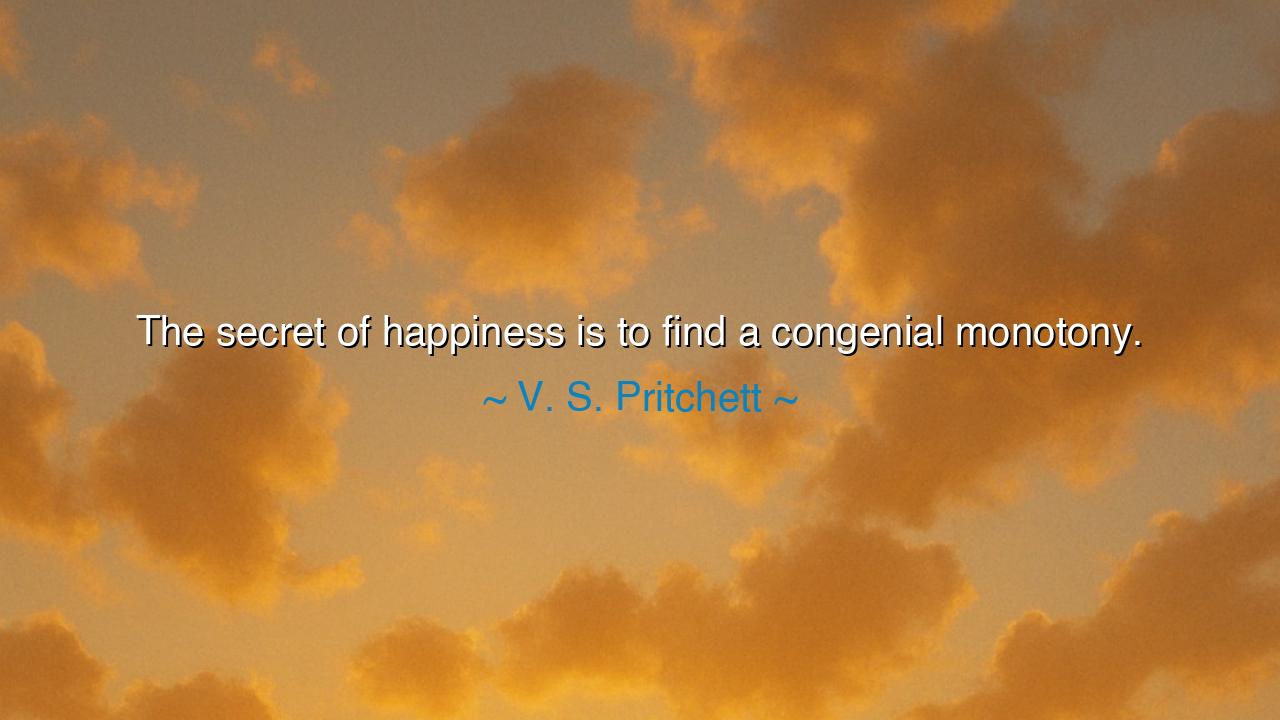
The secret of happiness is to find a congenial monotony.






“The secret of happiness is to find a congenial monotony.”
Thus spoke V. S. Pritchett, the English master of observation and human nature, whose pen captured the quiet rhythm of ordinary lives. In these few words, he reveals a truth that runs contrary to the fever of our age—a truth that echoes the wisdom of old: that happiness does not dwell in constant excitement, nor in the pursuit of novelty, but in the peaceful acceptance of life’s repeating rhythms. To find a congenial monotony is to make peace with the everyday, to find beauty in the familiar, and to discover serenity in the small, recurring rituals that sustain the soul.
Pritchett was a man who understood the texture of ordinary existence. He lived through wars, economic hardship, and the restless churn of the 20th century, yet he looked not to the spectacular, but to the simple and enduring patterns of life for meaning. His “congenial monotony” is not a life without variety—it is a life aligned with one’s nature, where the repetitive acts of work, love, and reflection are not burdens but blessings. It is the steadiness of the craftsman shaping wood each day, the gardener tending the same soil, the writer facing the blank page again and again. True happiness, he tells us, is not found in escape from routine, but in the transformation of routine into something beloved.
The ancients, too, whispered this wisdom. Aristotle spoke of eudaimonia—the flourishing life—as not one of endless thrills, but of harmonious habit. The Stoics taught that the soul finds peace when it lives in accordance with its purpose, when the daily labor of life becomes a ritual of meaning. The peasant who plows his field with care, the scholar who reads by candlelight, the parent who wakes before dawn for the sake of the child—all live within the circle of “congenial monotony.” They may repeat the same actions, but each repetition refines the spirit, deepens patience, and polishes gratitude.
Consider the life of Vincent van Gogh, whose days were filled with the same quiet discipline: mixing colors, painting fields, writing to his brother, and watching the play of light on the horizon. To others, his days might have seemed monotonous, even lonely—but to him, there was a sacred joy in that constancy. His art was born not of endless change, but of endless devotion. It was through his steadfastness in simple work that he found moments of transcendence. His “monotony” became his temple. In this we see Pritchett’s truth: that happiness is not the absence of repetition, but the harmony between repetition and purpose.
We live in an age intoxicated by novelty. We are taught that excitement is the measure of life, and that monotony is death. Yet, as Pritchett reminds us, this is a deception. The heart that cannot endure stillness will never know peace. The one who chases constant change will find only weariness. For even the seasons, in all their splendor, move in a circle: spring returns, summer fades, autumn falls, winter sleeps—and then begins again. To resist this rhythm is to resist life itself. Happiness belongs not to those who escape repetition, but to those who learn to love it—who find in their own routines the poetry of existence.
To practice this wisdom, one must begin by slowing down. Look upon your daily habits—your morning walk, your work, your meals, your conversations—and ask: can I make these sacred? The “congenial” monotony Pritchett speaks of is not drudgery; it is chosen, embraced, and loved. It is a monotony made beautiful through mindfulness. The potter shaping clay, the teacher repeating lessons, the musician practicing scales—all find joy in doing what they were born to do, again and again. When the heart is aligned with its work, repetition becomes rhythm, and rhythm becomes peace.
And so, my child, take this teaching as a lantern for your path: seek not a life of endless novelty, but a life of meaningful repetition. Do not despise the ordinary, for within it lies eternity. Choose a way of living—whether it be your craft, your service, your art, or your care for others—that feels natural and good to your soul, and then give yourself wholly to it. Let your days echo with the gentle cadence of contentment, the kind that grows not from great victories, but from the faithful tending of small things.
For in the end, as Pritchett teaches, the secret of happiness is not in escaping life’s sameness, but in finding a monotony that fits the contours of your spirit—a rhythm that is your own. When you find it, embrace it, and live within it as one lives within a beloved melody. For the happiest lives are not those filled with noise and chaos, but those that move quietly, steadily, and gracefully to the timeless music of the soul.






AAdministratorAdministrator
Welcome, honored guests. Please leave a comment, we will respond soon